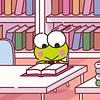You need to sign in or sign up before continuing.
Take a photo of a barcode or cover
hopeful
inspiring
lighthearted
fast-paced
Plot or Character Driven:
Plot
Strong character development:
Yes
Loveable characters:
Yes
Diverse cast of characters:
Complicated
Flaws of characters a main focus:
Yes
lighthearted
fast-paced
emotional
hopeful
inspiring
lighthearted
reflective
medium-paced
Plot or Character Driven:
Character
Strong character development:
Yes
Loveable characters:
Yes
Diverse cast of characters:
Yes
Flaws of characters a main focus:
Yes
emotional
lighthearted
fast-paced
lighthearted
fast-paced
I thought love was this huge, inexplicable thing that would totally overwhelm me.
But I don’t think my love is like that. It’s something I chose to reach for myself.
Been a minute since I finished an entire manga series, so this feels good to me. And I loved it, so it feels even better! This was a really sweet, really cute conclusion to the series. The writing felt tight, like we really brought everything full circle, and address all the issues and insecurities that Yuu and Touko had, and why their evolution and the ways they changed made their HEA possible. It was really cute! And I'm glad that the manga didn't end with their resolution; it was really nice to have a few chpaters with them being happy and adorable together, going on dates, figuring out their next steps, seeing them in college. I kinda wish some of those scenes hadn't taken place until college, lol, but whatever. This was mostly just so cute. I loved seeing Yuu being blushy and shy, swept away by her feelings, and just being able to securely bask in loving and being loved. We got a little mini wrap up for most of the other characters as well, and some hints as to what's going on in Saeki's life. A nice teaser for her spin-off series.
I really enjoyed my time with this series. Some parts of it were a bit shaky and not as well-written, but it pulled through in the end. This last volume is probably more of a 3.5, content-wise, but I'm still thinking of it as a 4, because it was just so sweet.
emotional
lighthearted
reflective
medium-paced
Plot or Character Driven:
Character
Strong character development:
Yes
Loveable characters:
Yes
challenging
emotional
hopeful
lighthearted
tense
fast-paced
Plot or Character Driven:
Character
Strong character development:
Yes
Loveable characters:
Yes
Diverse cast of characters:
Complicated
Flaws of characters a main focus:
Yes
Moderate: Sexual content
A friend is a true yuri connoisseur and gave me a full rundown on The State of the Genre a few days ago. She said that Bloom Into You is the full flowering, the zenith, the greatest possible example of the High School Romance type, and that starting here would preclude me from having to read any others of that type, while still gearing my brain for the genre's conventions and tropes. So! Here is where I started.
It was an interesting read. I've now read some manga, in various genres, but not a great deal, so it's hard to know exactly what sorts of characterization and pacing choices are due to genre, and which are best critiqued as actual flaws. In this case, I felt that the first handful of volumes had three major problems -- no, make that four -- which I will describe in greater detail later on, because I think it is more important to describe the general impression I had, which was as follows. The manga felt that it started very "thin" in several ways, then slowly built up depth, breadth, and texture, such that by the end (but before the epilogue), it achieved a degree of body that was effective in provoking an emotional response and having Something to Say.
As for the flaws in those first volumes, the most major ones in my opinion were the "cute girl" Yuu's lack of a personality, and the very slow start of the plot. Without strong characters, it is difficult to construct a convincing and absorbing plot, and vice versa. In a visual medium, it's both easier and harder to build character, and I felt Nakatani could have used both words and images better to set up our expectations for Yuu, which would have made the entire edifice of the story feel more grounded and earned, even once things picked up and fleshed out in later volumes. Part of her character growth, of course, is to become less passive and more self-aware, but I don't think complete flatness is the best way to show that starting point!
Meanwhile, Touko's role near the beginning made some of the old "predatory lesbian trope" sensors twinge unpleasantly, though she too is given a great deal more depth and, you know, normal human behavioral traits as the series progresses. By the end, the two of them, as the primary couple, fall into a relatively believable, and somewhat realistic, relationship, where I particularly appreciated the clear-eyed portrayal of the difficulties of being in different life-stages, being out to some people but not all, and changing as a person while trying to keep a relationship whole.
The best part of the whole series, though, and the part that I truly think makes the manga more than run-of-the-mill, was the depth and interest of the side characters, from the novelist to the aromantic student council secretary, to Yuu's adult sister. In fact, I think the most poignant and believable arc of all of them is that of the main secondary character, Sayaka. Her journey towards self-acceptance involves getting over a first relationship marred by internalized homophobia, which influences her fixation on Touko as a safe, unobtainable love interest. Touko is not the be-all-and-end all of her relationship to her queerness, though, and her relationship with Yuu is given due weight -- but the greatest thing is that she finds an adult lesbian couple through school connections and becomes friends with them, seeking mentorship and advice and receiving compassionate guidance. These three -- Sayaka and the two adult lesbians -- are some of the most believable characters in the series, and their relationship is so precious, so realistic, and so under-depicted as a type in all media, and certainly, I'd imagine, in high school yuri manga. To be honest, I think Sayaka's story should have been granted a great deal more page time! It had the psychological heft and delicate character work that the main two characters were lacking.
Overall, I am glad I read it, and I am also glad that, per my friend, this excuses me from others of the high school genre. Much of the thinness I perceived, I'm sure, derives partly from the fact that I am simply not that interested in high school stories any longer, in any genre. By the end, when it seemed Nakatani had the bit between her teeth, it was truly a good work of fiction, full of depth and conviction -- I only wish it had displayed those qualities all the way through.
It was an interesting read. I've now read some manga, in various genres, but not a great deal, so it's hard to know exactly what sorts of characterization and pacing choices are due to genre, and which are best critiqued as actual flaws. In this case, I felt that the first handful of volumes had three major problems -- no, make that four -- which I will describe in greater detail later on, because I think it is more important to describe the general impression I had, which was as follows. The manga felt that it started very "thin" in several ways, then slowly built up depth, breadth, and texture, such that by the end (but before the epilogue), it achieved a degree of body that was effective in provoking an emotional response and having Something to Say.
As for the flaws in those first volumes, the most major ones in my opinion were the "cute girl" Yuu's lack of a personality, and the very slow start of the plot. Without strong characters, it is difficult to construct a convincing and absorbing plot, and vice versa. In a visual medium, it's both easier and harder to build character, and I felt Nakatani could have used both words and images better to set up our expectations for Yuu, which would have made the entire edifice of the story feel more grounded and earned, even once things picked up and fleshed out in later volumes. Part of her character growth, of course, is to become less passive and more self-aware, but I don't think complete flatness is the best way to show that starting point!
Meanwhile, Touko's role near the beginning made some of the old "predatory lesbian trope" sensors twinge unpleasantly, though she too is given a great deal more depth and, you know, normal human behavioral traits as the series progresses. By the end, the two of them, as the primary couple, fall into a relatively believable, and somewhat realistic, relationship, where I particularly appreciated the clear-eyed portrayal of the difficulties of being in different life-stages, being out to some people but not all, and changing as a person while trying to keep a relationship whole.
The best part of the whole series, though, and the part that I truly think makes the manga more than run-of-the-mill, was the depth and interest of the side characters, from the novelist to the aromantic student council secretary, to Yuu's adult sister. In fact, I think the most poignant and believable arc of all of them is that of the main secondary character, Sayaka. Her journey towards self-acceptance involves getting over a first relationship marred by internalized homophobia, which influences her fixation on Touko as a safe, unobtainable love interest. Touko is not the be-all-and-end all of her relationship to her queerness, though, and her relationship with Yuu is given due weight -- but the greatest thing is that she finds an adult lesbian couple through school connections and becomes friends with them, seeking mentorship and advice and receiving compassionate guidance. These three -- Sayaka and the two adult lesbians -- are some of the most believable characters in the series, and their relationship is so precious, so realistic, and so under-depicted as a type in all media, and certainly, I'd imagine, in high school yuri manga. To be honest, I think Sayaka's story should have been granted a great deal more page time! It had the psychological heft and delicate character work that the main two characters were lacking.
Overall, I am glad I read it, and I am also glad that, per my friend, this excuses me from others of the high school genre. Much of the thinness I perceived, I'm sure, derives partly from the fact that I am simply not that interested in high school stories any longer, in any genre. By the end, when it seemed Nakatani had the bit between her teeth, it was truly a good work of fiction, full of depth and conviction -- I only wish it had displayed those qualities all the way through.
emotional
hopeful
fast-paced
Plot or Character Driven:
Character
Strong character development:
Yes
Loveable characters:
Yes
Diverse cast of characters:
Complicated
Flaws of characters a main focus:
Yes
I think it did everything it wanted to







